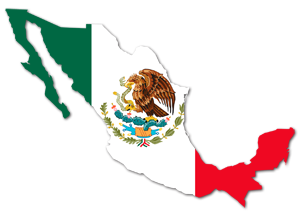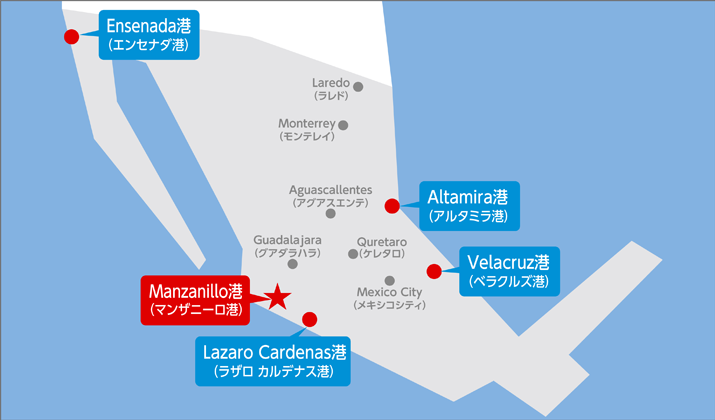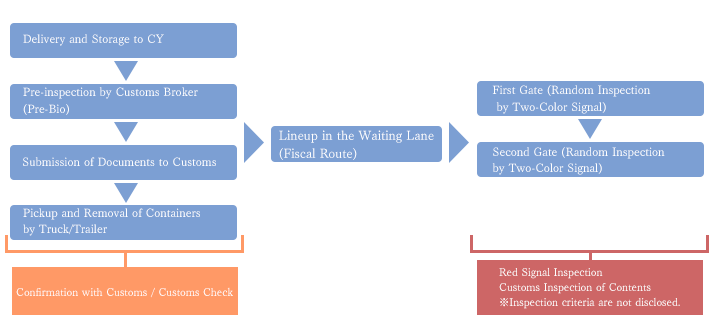Transport Services to Mexico
The country of Mexico

The United Mexican States, commonly known as Mexico, is a
federal republic located in the southern part of North
America. It shares borders with the United States to the
north, Guatemala and Belize to the southeast, the Pacific
Ocean to the west, and the Gulf of Mexico and the Caribbean
Sea to the east. The capital is Mexico City, and the official
language is Spanish. The total population is approximately 120
million, though it is expected to decline in the future.
Mexico is the most populous Spanish-speaking country in the
world. Its area is roughly five times that of Japan, covering
1.95 million square kilometers. The name "Mexico" was chosen
during the War of Independence in 1821 and originates from the
Aztec language, Nahuatl (nāhuatl), meaning "the land of
Mēxihco." Mēxihco (also written as Mexihco) refers to an
alternate name for Huitzilopochtli, the Aztec god of war, the
sun, and hunting, which means "the chosen one of the gods."
The most worshiped god of the Aztecs, his name was combined
with the suffix "-co," indicating a place, to express the
desire for independence and prosperity in this land. Regarding
the inclusion of "United States" in its official name, some
Mexicans express dissatisfaction, as the term "United States"
often refers exclusively to the United States of America,
overshadowing Mexico. This has led to calls for changing the
country’s name to simply "Mexico." This sentiment has been
particularly noticeable since the late 19th century, following
Mexico's defeat in the Mexican-American War, and the issue has
been debated in Mexico for many years. In 2023, Mexico's
nominal GDP was $1.7888 trillion, ranking 12th in the world.
Its economy is about the same size as South Korea's and ranks
second in Latin America, after Brazil. Mexico’s per capita GDP
stands at $13,804, slightly above the global average. It is an
observer in MERCOSUR and the South American Community, and a
member of the OECD, APEC, and NAFTA. Mexico is rich in oil,
especially along the Caribbean coast, and oil has been a major
source of foreign currency, mainly through the state-owned
company Pemex since World War II. Mexico is also famous
worldwide for its silver and opal production. Other
significant sources of foreign revenue include the fishing
industry, tourism, salt production, and beer manufacturing.
Since the early 20th century, industrialization has progressed
in Mexico, with thriving production in the automotive, steel,
and electronics sectors. Its major trading partners include
the United States, Canada, Japan, and Spain. Since the North
American Free Trade Agreement (NAFTA) came into effect on
January 1, 1994, Mexico has increased its production of
automobiles and electronics for the U.S. and Canadian markets,
leveraging its low labor costs. However, this has also
heightened Mexico’s economic dependence on the U.S., prompting
efforts to diversify economic partnerships with countries
outside NAFTA. On September 17, 2004, Mexico formally agreed
with Japan on the Japan-Mexico Economic Partnership Agreement,
which aimed to reduce tariffs and non-tariff barriers and
grant most-favored-nation status. As of January 2008, all
agricultural products, including corn—the last to remain
protected—had their tariffs fully eliminated under NAFTA,
making them freely importable.
Cargo sea transport from Japan to Mexico
Maritime Transport
|
MANZANILLO (Direct Service / POL YOKOHAMA) |
About 14 days |
| MANZANILLO(Asian Ports T/S) | About 35~45 days |
| Main Shipping Lines |
ONE, Cosco, CMA, Hamburg Süd, MSC, EVERGREEN, YANGMING, WANHAI, APL, MAERSK etc. |
| Main Ports | ENSENADA、LAZARO CARDENAS、ALTAMIRA、VELACRUZ etc. |
Main ports of Mexico

Import Situation in Mexico
Taking the port of Manzanillo as an example, the customs
clearance for imported goods currently takes approximately 5-7
days. Additionally, similar to the United States, Mexico has a
24-hour rule (AMS). Failure to comply with the application
rules may result in substantial penalties.
Import flow in Mexico
| Unloading from the vessel to CY | About 1days |
| Previo (Pre-Customs Inspection) |
2–3 days This inspection is conducted at a dedicated CY (container yard), where the container seal is opened for inspection. Afterward, the "customs broker's container seal" is applied. ↓ The declaration documents (Pedimento) are submitted to customs, and duties are paid. |
| Main Customs Inspection |
2–3 days An X-ray inspection is performed, and two random checks are indicated by a traffic signal installed at the gate. ↓※The inspection criteria are completely confidential. If the signal turns red, an opening inspection will be conducted. |
| Not all cargo undergoes customs clearance procedures at the port; it is possible to transit the cargo inland and carry out customs clearance in a bonded area. | |
The flow for customs clearance and container release for import
containers

Incentives for foreign investment
Since 1994, Mexico has actively welcomed new foreign companies
and has implemented several incentives related to exports and
imports from the perspective of promoting production.
| Maquiladora Program | A policy that reduces or exempts import duties and value-added taxes for foreign companies operating factories within Mexico. |
|---|---|
| PITEX | A system that allows the temporary duty-free import of raw materials and components needed for the production of export-oriented products. |
| IMMEX | A program that integrates both of the above. |
| PROSEC | Duty reduction program offering preferential treatment for the importation of components and machinery used by manufacturing industries based in Mexico. |
Mexico's corporate tax system (2024)
Federal taxes
| Corporate Tax | 30% |
|---|---|
| Personal Income Tax (ISR) | For Japanese expatriates (general standard), roughly 30%, 32%, or 34%, depending on the income level |
| Value-Added Tax (IVA) | 16% (The 11% rate applied to border regions was abolished in 2014) |
| State and Municipal Taxes | Payroll Tax (State): Generally 2% of total employee salaries in most states, 2.5% in Mexico City. |
|---|
Challenges in Mexico
In Mexico, customs procedures for imports and exports must be
conducted by customs brokers (shippers cannot perform customs
procedures themselves). As foreign nationals are not granted
customs broker licenses, shippers, especially Japanese clients,
often express dissatisfaction regarding high procedure costs,
lengthy customs processing times, and the slow advancement of
electronic customs declarations.
In Mexico, customs procedures for imports and exports must be
conducted by customs brokers (shippers cannot perform customs
procedures themselves). As foreign nationals are not granted
customs broker licenses, shippers, especially Japanese clients,
often express dissatisfaction regarding high procedure costs,
lengthy customs processing times, and the slow advancement of
electronic customs declarations.
In Manzanillo, the concept of demurrage does not exist; instead,
a free terminal storage period of 7 days is provided. The term
"free time" in Mexico refers to detention, and the typical
period granted by shipping companies is around 7 days.
Container depot charges amount to $1,000 per container. In
Mexico, when picking up cargo, shippers must deposit the
specified deposit amount with the shipping company to obtain the
container.
Address
JAPAN TRUST
Nagoya head office
9th floor, Marunouchi Estate Building, 2-17-12, Marunouchi, Naka-ku, Nagoya, Aichi 460-0002 Japan
Tokyo head office
7th Floor, Shinagawa East One Towerbr 2-16-1,Konan, Minato-ku, Tokyo 108-0075 Japan 1
Osaka branch
2706 Branz Tower, 4-3-16, Minamihonmachi, Chuo-Ku, Osaka 541-0054 Japan

